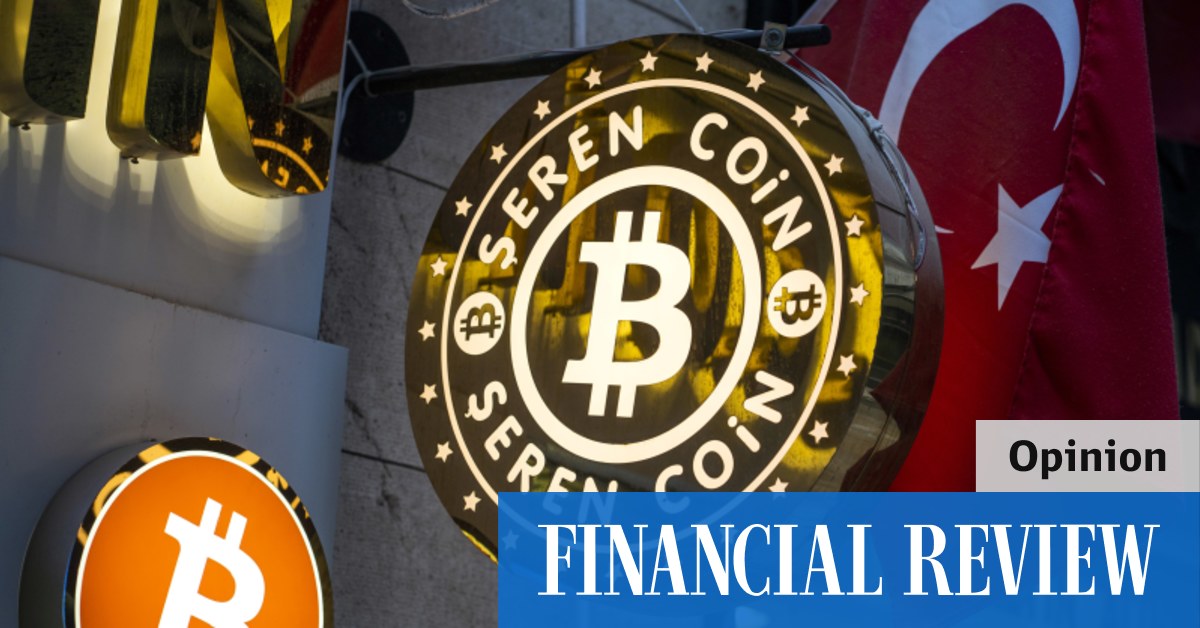Opinion
Despite being touted as a future form of private money to challenge fiat currency, crypto is not a financial asset. A purchaser of bitcoin or any other cryptocurrency is simply paying to gamble.
Treasury is considering submissions on appropriate regulation of CASSPRs (crypto asset secondary service providers), which are the main gateway for individuals and firms to interact with the cryptocurrency sector. This comes after the Morrison government accepted recommendations from a Senate committee inquiry that endorsed the overblown hype about the important future role of “crypto”.
One proposal is to designate cryptocurrencies and tokens as financial products, such that financial regulation can be applied to products, services and operators in the crypto ecospace.
The new government must push back on talk of regulating the cryptocurrency space, Kevin Davis argues. Bloomberg
This (I have argued in a submission) is not a desirable course of action; and to make regulation of CASSPRs the first focus is putting the cart before the horse. Crypto products are diverse and CASSPRs may deal in a range of such products – some of which may warrant designation as financial products, although many do not.
Despite being touted by its promoters as a future form of private money to challenge fiat currency, crypto is not a financial asset. A purchaser of bitcoin or any other cryptocurrency is simply paying to gamble. They win if someone else is subsequently willing to pay a higher amount to have their name substituted (in an anonymous form) on the blockchain record.
Cryptocurrencies can be used for some buying and selling transactions among willing parties (similar to barter activities), but they will never be able to replace a fiat currency. For one thing, the highly resource-intensive verification processes make them incapable of scaling up to provide the instantaneous settlement that consumers expect, amid the multi-million transactions that occur each day when using currency or debit cards.
Some crypto products, such as stablecoins and initial coin offerings, attempt to mimic or provide variants on financial sector products and activities, and may justify designation as a financial product or activity. Identifying what may warrant such a designation and what does not is a more appropriate starting point for regulation.
Perhaps more importantly, the notion that a special regulatory approach is relevant for any such crypto asset is misguided. The blockchain and cryptography arrangements that are the distinguishing characteristic should be thought of as simply a different form of “back office” for recording ownership and transactions.
Just as a regulator might apply different operational risk regulation to providers of a product, where one has a paper-based ledger and processes and the other is computer-based, so it should be with crypto.
It is the economic functions performed by a product or service which should be the key consideration for how to regulate, not the back office arrangements.
A further problem arises from an “institution focused” approach to regulation (as with proposed CASSPRs regulation) compared to a “functional approach”. The “institution” approach is relatively easy, but runs two main risks.
One is that the same functions provided by different institutions will be regulated differently, creating an uneven playing field.
The second is that other institutions can emerge outside the regulated sector to provide the same functions, such as the growth of “shadow banks” engaged in similar (but slightly different) credit creation activities to regulated banks. (In this case, providers of such shadow – or “ghost” – activities might be referred to as “CASPERS”, even though they might not be friendly ghosts!)
Although touted by its promoters as a future form of private money to challenge fiat currency, crypto is not a financial asset.
There is no question that the crypto ecospace requires some form of regulation to protect poorly informed and gullible individuals (and institutions) from unwarranted engagement and unsuspecting risk taking.
The potential for profiting (or losing) from gambling in cryptocurrency positions does not reflect any skills or superior knowledge – unless one is skilled in predicting the “madness of crowds”.
Because entry into the ecospace as a creator/supplier of different cryptocurrencies and tokens is relatively easy and low cost, the sector has burgeoned.
Success requires attracting interest in the new product; hence the proliferation of marketing and advertising that extols the virtues of the product and potential gains.
Clamping down on misleading advertising, marketing and advice is definitely needed. Perhaps this is easier if the activities are subject to financial product and service regulation.
But designating pure gambling activities as financial products would give them a credence that they do not deserve, possibly encourage unwarranted growth, and make the regulatory task in dealing with poorly informed consumers that much harder.
Follow the topics, people and companies that matter to you.
Fetching latest articles
The Daily Habit of Successful People
Author
Administraroot


